CSU Assignment 3: Ethical Theory of Facial Recognition Software
VerifiedAdded on 2021/06/17
|8
|1644
|20
Report
AI Summary
This report, prepared by a student at the School of Computing and Maths, Charles Sturt University, analyzes the ethical implications of facial recognition software. The report examines the technology's impact through various ethical theories, including utilitarianism, deontology, virtue theory, and contract theory. It explores the potential benefits and negative consequences of facial recognition, considering factors such as privacy, societal impact, and the responsibilities of developers and users. The analysis includes discussions on ethical issues, implications, and potential solutions, offering a comprehensive overview of the ethical challenges posed by facial recognition software and its application. The report emphasizes the importance of considering ethical frameworks when implementing such technologies to ensure societal benefits and mitigate potential harms. The report concludes with a summary of the key findings and recommendations for responsible development and deployment of facial recognition systems.
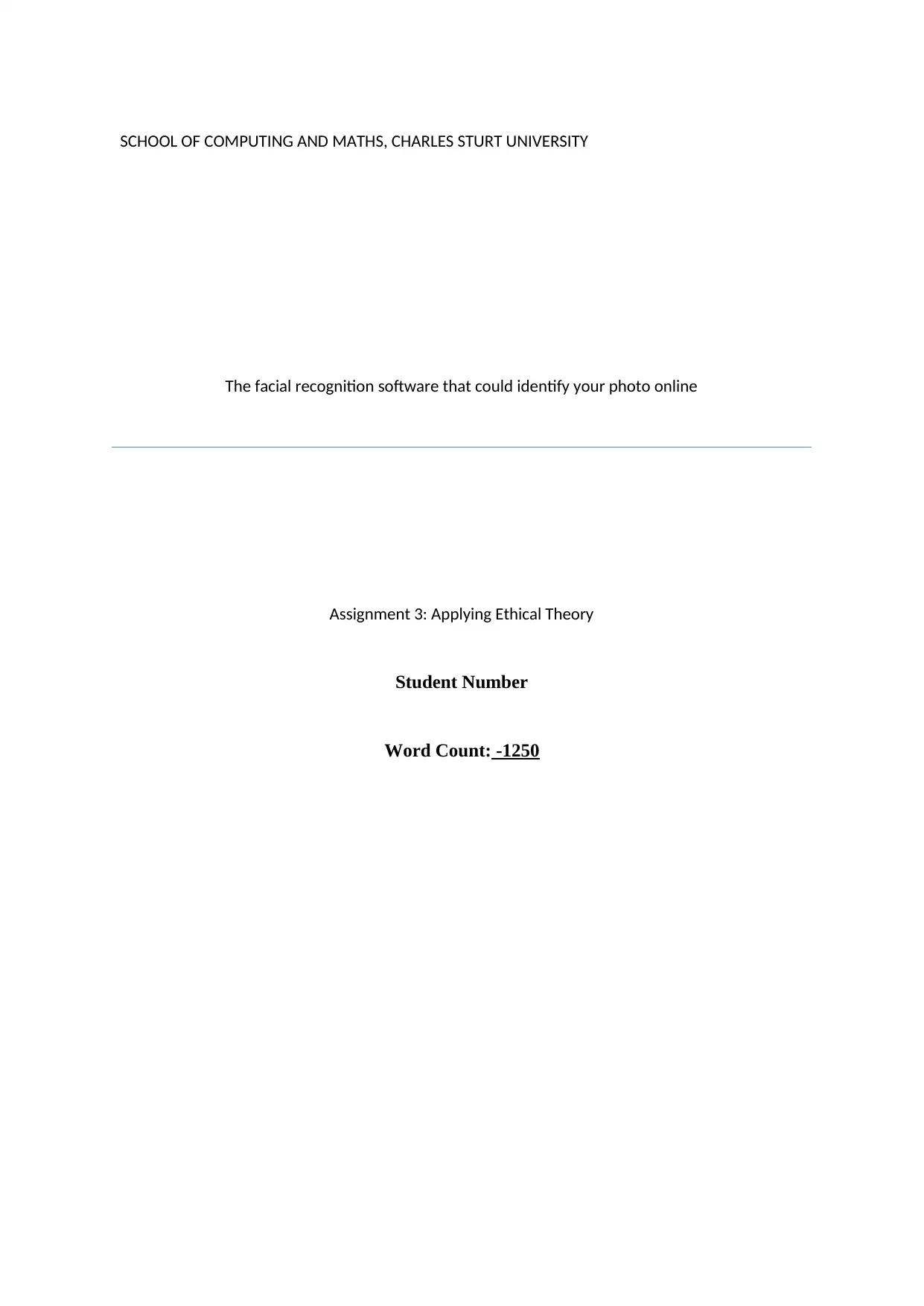
SCHOOL OF COMPUTING AND MATHS, CHARLES STURT UNIVERSITY
The facial recognition software that could identify your photo online
Assignment 3: Applying Ethical Theory
Student Number
Word Count: -1250
The facial recognition software that could identify your photo online
Assignment 3: Applying Ethical Theory
Student Number
Word Count: -1250
Paraphrase This Document
Need a fresh take? Get an instant paraphrase of this document with our AI Paraphraser
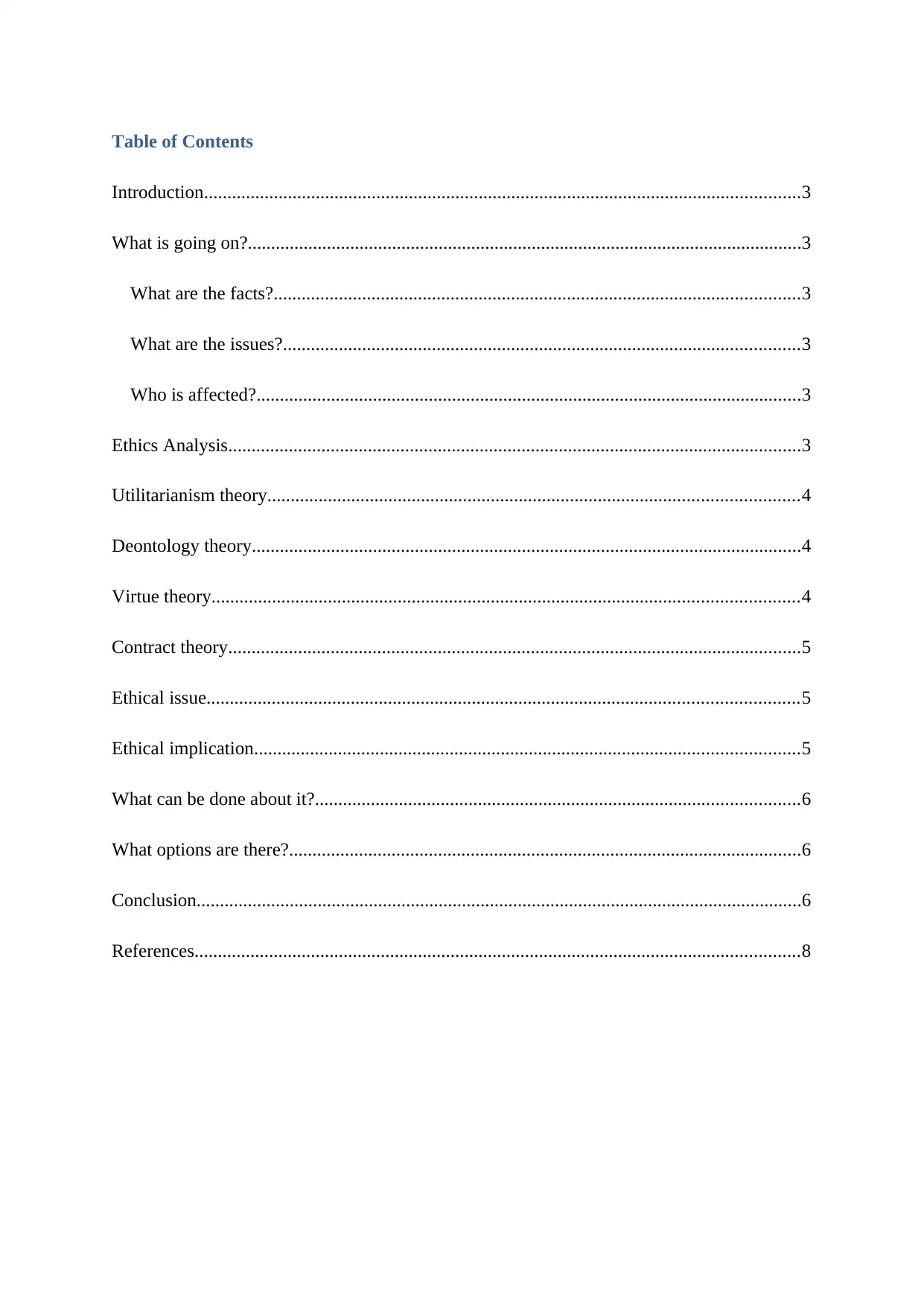
Table of Contents
Introduction................................................................................................................................3
What is going on?.......................................................................................................................3
What are the facts?.................................................................................................................3
What are the issues?...............................................................................................................3
Who is affected?.....................................................................................................................3
Ethics Analysis...........................................................................................................................3
Utilitarianism theory..................................................................................................................4
Deontology theory......................................................................................................................4
Virtue theory..............................................................................................................................4
Contract theory...........................................................................................................................5
Ethical issue...............................................................................................................................5
Ethical implication.....................................................................................................................5
What can be done about it?........................................................................................................6
What options are there?..............................................................................................................6
Conclusion..................................................................................................................................6
References..................................................................................................................................8
Introduction................................................................................................................................3
What is going on?.......................................................................................................................3
What are the facts?.................................................................................................................3
What are the issues?...............................................................................................................3
Who is affected?.....................................................................................................................3
Ethics Analysis...........................................................................................................................3
Utilitarianism theory..................................................................................................................4
Deontology theory......................................................................................................................4
Virtue theory..............................................................................................................................4
Contract theory...........................................................................................................................5
Ethical issue...............................................................................................................................5
Ethical implication.....................................................................................................................5
What can be done about it?........................................................................................................6
What options are there?..............................................................................................................6
Conclusion..................................................................................................................................6
References..................................................................................................................................8
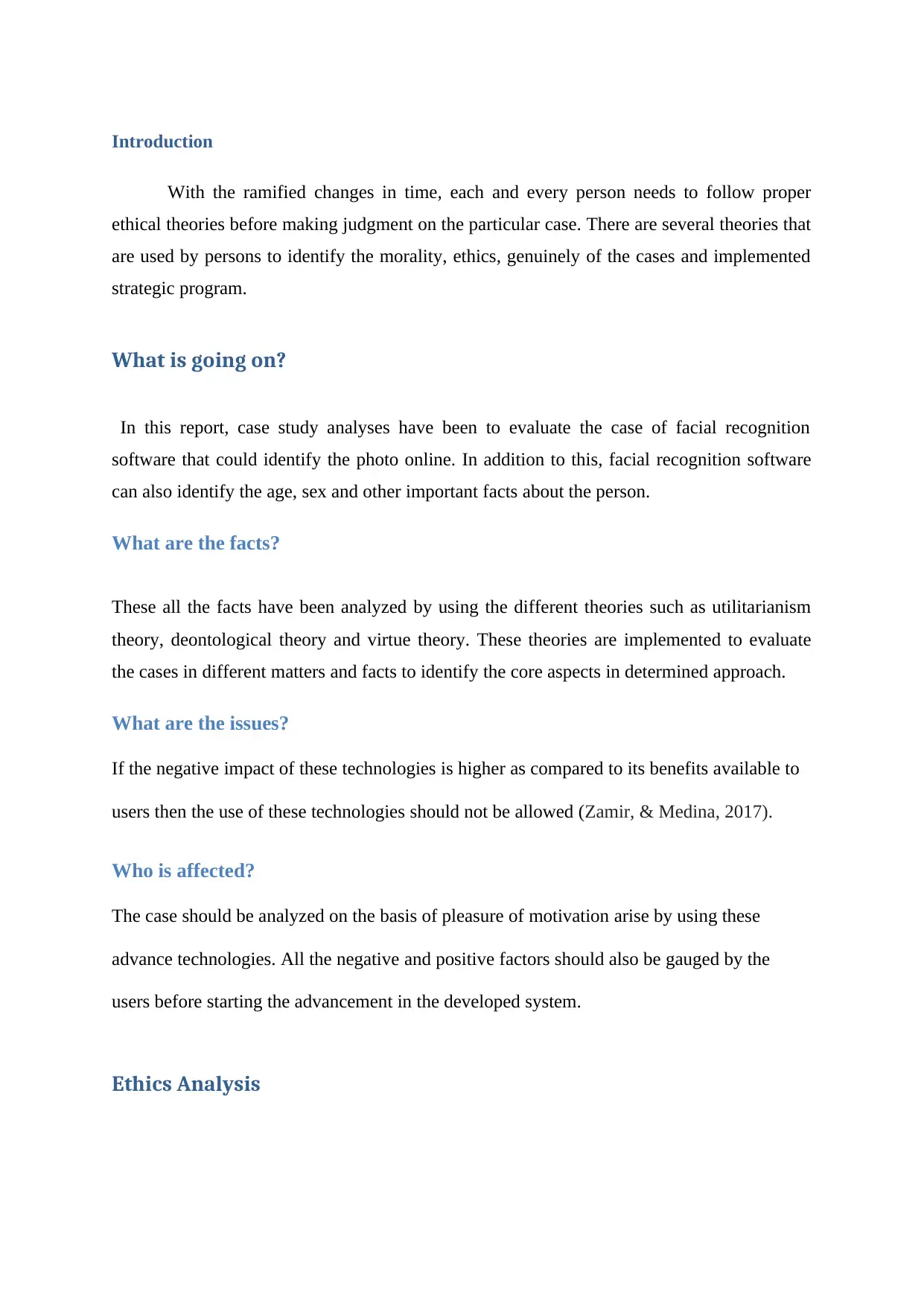
Introduction
With the ramified changes in time, each and every person needs to follow proper
ethical theories before making judgment on the particular case. There are several theories that
are used by persons to identify the morality, ethics, genuinely of the cases and implemented
strategic program.
What is going on?
In this report, case study analyses have been to evaluate the case of facial recognition
software that could identify the photo online. In addition to this, facial recognition software
can also identify the age, sex and other important facts about the person.
What are the facts?
These all the facts have been analyzed by using the different theories such as utilitarianism
theory, deontological theory and virtue theory. These theories are implemented to evaluate
the cases in different matters and facts to identify the core aspects in determined approach.
What are the issues?
If the negative impact of these technologies is higher as compared to its benefits available to
users then the use of these technologies should not be allowed (Zamir, & Medina, 2017).
Who is affected?
The case should be analyzed on the basis of pleasure of motivation arise by using these
advance technologies. All the negative and positive factors should also be gauged by the
users before starting the advancement in the developed system.
Ethics Analysis
With the ramified changes in time, each and every person needs to follow proper
ethical theories before making judgment on the particular case. There are several theories that
are used by persons to identify the morality, ethics, genuinely of the cases and implemented
strategic program.
What is going on?
In this report, case study analyses have been to evaluate the case of facial recognition
software that could identify the photo online. In addition to this, facial recognition software
can also identify the age, sex and other important facts about the person.
What are the facts?
These all the facts have been analyzed by using the different theories such as utilitarianism
theory, deontological theory and virtue theory. These theories are implemented to evaluate
the cases in different matters and facts to identify the core aspects in determined approach.
What are the issues?
If the negative impact of these technologies is higher as compared to its benefits available to
users then the use of these technologies should not be allowed (Zamir, & Medina, 2017).
Who is affected?
The case should be analyzed on the basis of pleasure of motivation arise by using these
advance technologies. All the negative and positive factors should also be gauged by the
users before starting the advancement in the developed system.
Ethics Analysis
⊘ This is a preview!⊘
Do you want full access?
Subscribe today to unlock all pages.

Trusted by 1+ million students worldwide
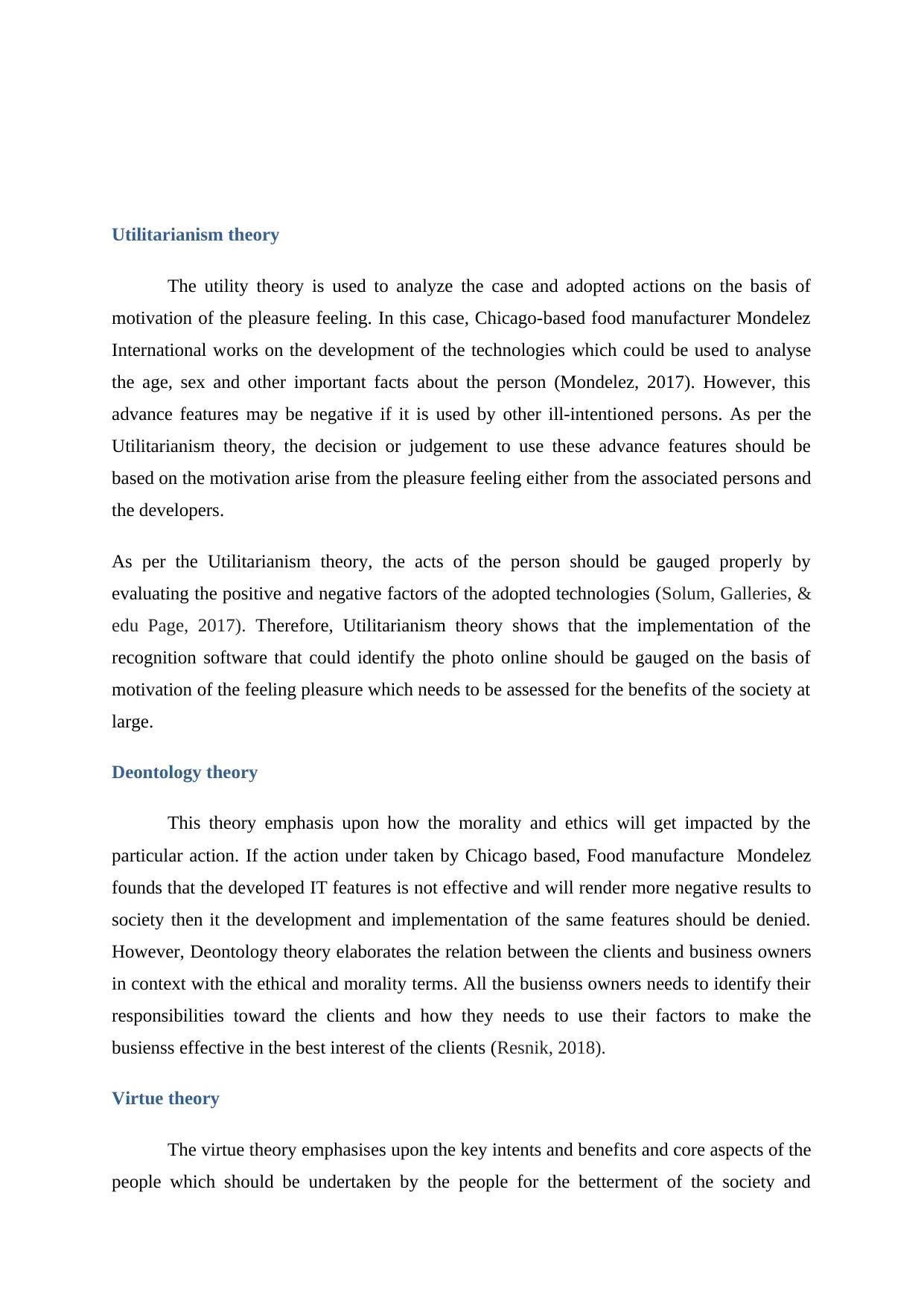
Utilitarianism theory
The utility theory is used to analyze the case and adopted actions on the basis of
motivation of the pleasure feeling. In this case, Chicago-based food manufacturer Mondelez
International works on the development of the technologies which could be used to analyse
the age, sex and other important facts about the person (Mondelez, 2017). However, this
advance features may be negative if it is used by other ill-intentioned persons. As per the
Utilitarianism theory, the decision or judgement to use these advance features should be
based on the motivation arise from the pleasure feeling either from the associated persons and
the developers.
As per the Utilitarianism theory, the acts of the person should be gauged properly by
evaluating the positive and negative factors of the adopted technologies (Solum, Galleries, &
edu Page, 2017). Therefore, Utilitarianism theory shows that the implementation of the
recognition software that could identify the photo online should be gauged on the basis of
motivation of the feeling pleasure which needs to be assessed for the benefits of the society at
large.
Deontology theory
This theory emphasis upon how the morality and ethics will get impacted by the
particular action. If the action under taken by Chicago based, Food manufacture Mondelez
founds that the developed IT features is not effective and will render more negative results to
society then it the development and implementation of the same features should be denied.
However, Deontology theory elaborates the relation between the clients and business owners
in context with the ethical and morality terms. All the busienss owners needs to identify their
responsibilities toward the clients and how they needs to use their factors to make the
busienss effective in the best interest of the clients (Resnik, 2018).
Virtue theory
The virtue theory emphasises upon the key intents and benefits and core aspects of the
people which should be undertaken by the people for the betterment of the society and
The utility theory is used to analyze the case and adopted actions on the basis of
motivation of the pleasure feeling. In this case, Chicago-based food manufacturer Mondelez
International works on the development of the technologies which could be used to analyse
the age, sex and other important facts about the person (Mondelez, 2017). However, this
advance features may be negative if it is used by other ill-intentioned persons. As per the
Utilitarianism theory, the decision or judgement to use these advance features should be
based on the motivation arise from the pleasure feeling either from the associated persons and
the developers.
As per the Utilitarianism theory, the acts of the person should be gauged properly by
evaluating the positive and negative factors of the adopted technologies (Solum, Galleries, &
edu Page, 2017). Therefore, Utilitarianism theory shows that the implementation of the
recognition software that could identify the photo online should be gauged on the basis of
motivation of the feeling pleasure which needs to be assessed for the benefits of the society at
large.
Deontology theory
This theory emphasis upon how the morality and ethics will get impacted by the
particular action. If the action under taken by Chicago based, Food manufacture Mondelez
founds that the developed IT features is not effective and will render more negative results to
society then it the development and implementation of the same features should be denied.
However, Deontology theory elaborates the relation between the clients and business owners
in context with the ethical and morality terms. All the busienss owners needs to identify their
responsibilities toward the clients and how they needs to use their factors to make the
busienss effective in the best interest of the clients (Resnik, 2018).
Virtue theory
The virtue theory emphasises upon the key intents and benefits and core aspects of the
people which should be undertaken by the people for the betterment of the society and
Paraphrase This Document
Need a fresh take? Get an instant paraphrase of this document with our AI Paraphraser
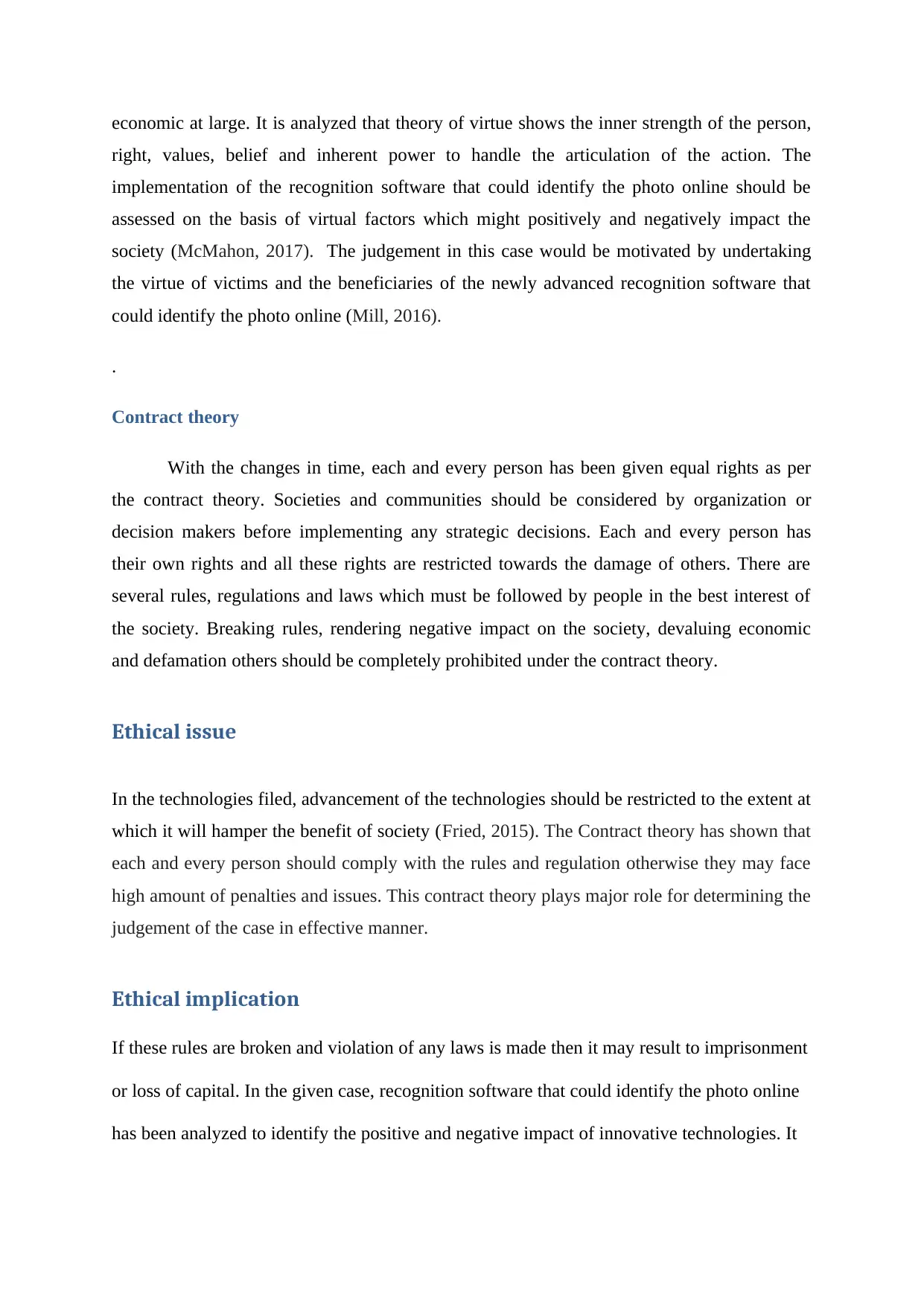
economic at large. It is analyzed that theory of virtue shows the inner strength of the person,
right, values, belief and inherent power to handle the articulation of the action. The
implementation of the recognition software that could identify the photo online should be
assessed on the basis of virtual factors which might positively and negatively impact the
society (McMahon, 2017). The judgement in this case would be motivated by undertaking
the virtue of victims and the beneficiaries of the newly advanced recognition software that
could identify the photo online (Mill, 2016).
.
Contract theory
With the changes in time, each and every person has been given equal rights as per
the contract theory. Societies and communities should be considered by organization or
decision makers before implementing any strategic decisions. Each and every person has
their own rights and all these rights are restricted towards the damage of others. There are
several rules, regulations and laws which must be followed by people in the best interest of
the society. Breaking rules, rendering negative impact on the society, devaluing economic
and defamation others should be completely prohibited under the contract theory.
Ethical issue
In the technologies filed, advancement of the technologies should be restricted to the extent at
which it will hamper the benefit of society (Fried, 2015). The Contract theory has shown that
each and every person should comply with the rules and regulation otherwise they may face
high amount of penalties and issues. This contract theory plays major role for determining the
judgement of the case in effective manner.
Ethical implication
If these rules are broken and violation of any laws is made then it may result to imprisonment
or loss of capital. In the given case, recognition software that could identify the photo online
has been analyzed to identify the positive and negative impact of innovative technologies. It
right, values, belief and inherent power to handle the articulation of the action. The
implementation of the recognition software that could identify the photo online should be
assessed on the basis of virtual factors which might positively and negatively impact the
society (McMahon, 2017). The judgement in this case would be motivated by undertaking
the virtue of victims and the beneficiaries of the newly advanced recognition software that
could identify the photo online (Mill, 2016).
.
Contract theory
With the changes in time, each and every person has been given equal rights as per
the contract theory. Societies and communities should be considered by organization or
decision makers before implementing any strategic decisions. Each and every person has
their own rights and all these rights are restricted towards the damage of others. There are
several rules, regulations and laws which must be followed by people in the best interest of
the society. Breaking rules, rendering negative impact on the society, devaluing economic
and defamation others should be completely prohibited under the contract theory.
Ethical issue
In the technologies filed, advancement of the technologies should be restricted to the extent at
which it will hamper the benefit of society (Fried, 2015). The Contract theory has shown that
each and every person should comply with the rules and regulation otherwise they may face
high amount of penalties and issues. This contract theory plays major role for determining the
judgement of the case in effective manner.
Ethical implication
If these rules are broken and violation of any laws is made then it may result to imprisonment
or loss of capital. In the given case, recognition software that could identify the photo online
has been analyzed to identify the positive and negative impact of innovative technologies. It
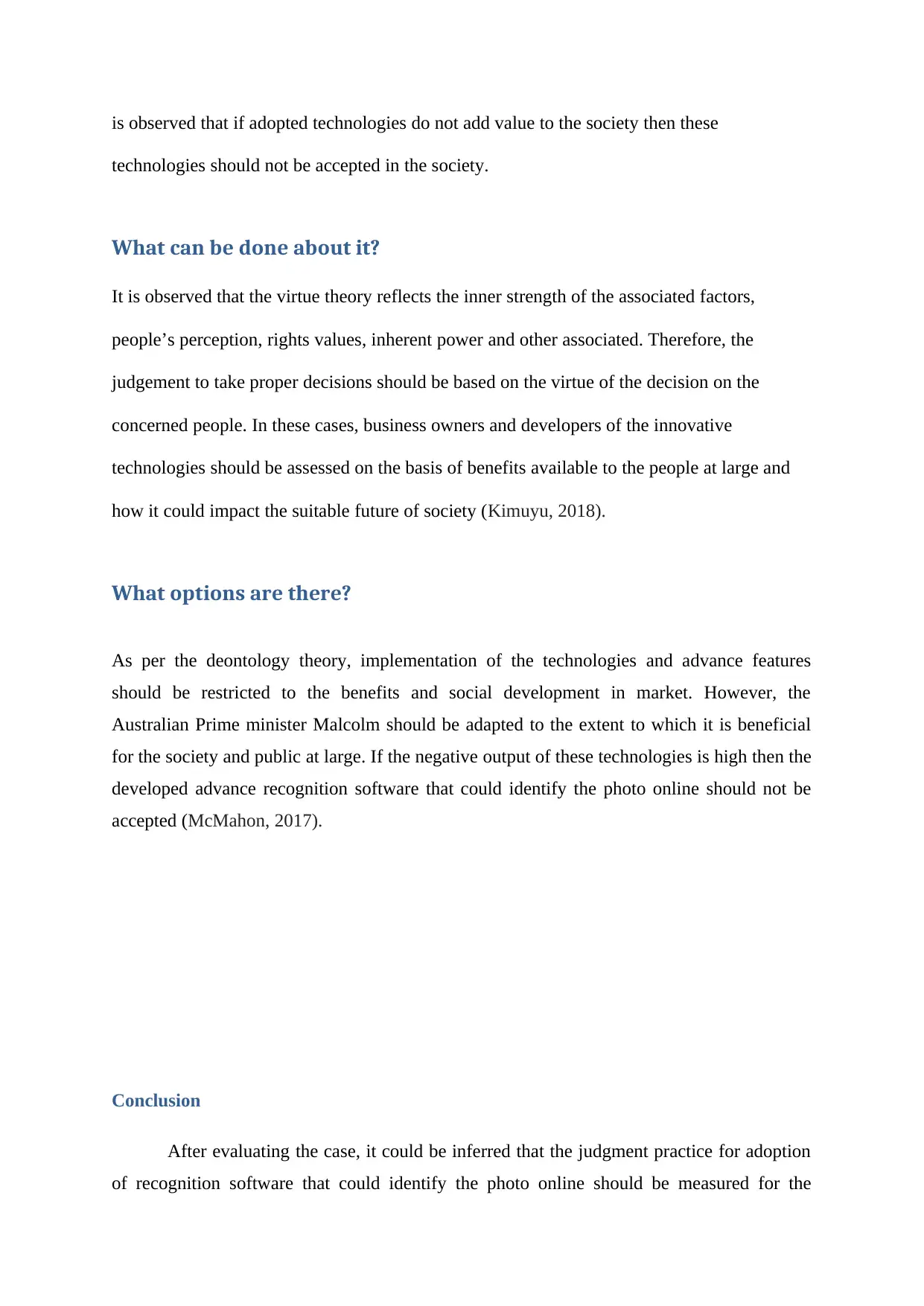
is observed that if adopted technologies do not add value to the society then these
technologies should not be accepted in the society.
What can be done about it?
It is observed that the virtue theory reflects the inner strength of the associated factors,
people’s perception, rights values, inherent power and other associated. Therefore, the
judgement to take proper decisions should be based on the virtue of the decision on the
concerned people. In these cases, business owners and developers of the innovative
technologies should be assessed on the basis of benefits available to the people at large and
how it could impact the suitable future of society (Kimuyu, 2018).
What options are there?
As per the deontology theory, implementation of the technologies and advance features
should be restricted to the benefits and social development in market. However, the
Australian Prime minister Malcolm should be adapted to the extent to which it is beneficial
for the society and public at large. If the negative output of these technologies is high then the
developed advance recognition software that could identify the photo online should not be
accepted (McMahon, 2017).
Conclusion
After evaluating the case, it could be inferred that the judgment practice for adoption
of recognition software that could identify the photo online should be measured for the
technologies should not be accepted in the society.
What can be done about it?
It is observed that the virtue theory reflects the inner strength of the associated factors,
people’s perception, rights values, inherent power and other associated. Therefore, the
judgement to take proper decisions should be based on the virtue of the decision on the
concerned people. In these cases, business owners and developers of the innovative
technologies should be assessed on the basis of benefits available to the people at large and
how it could impact the suitable future of society (Kimuyu, 2018).
What options are there?
As per the deontology theory, implementation of the technologies and advance features
should be restricted to the benefits and social development in market. However, the
Australian Prime minister Malcolm should be adapted to the extent to which it is beneficial
for the society and public at large. If the negative output of these technologies is high then the
developed advance recognition software that could identify the photo online should not be
accepted (McMahon, 2017).
Conclusion
After evaluating the case, it could be inferred that the judgment practice for adoption
of recognition software that could identify the photo online should be measured for the
⊘ This is a preview!⊘
Do you want full access?
Subscribe today to unlock all pages.

Trusted by 1+ million students worldwide
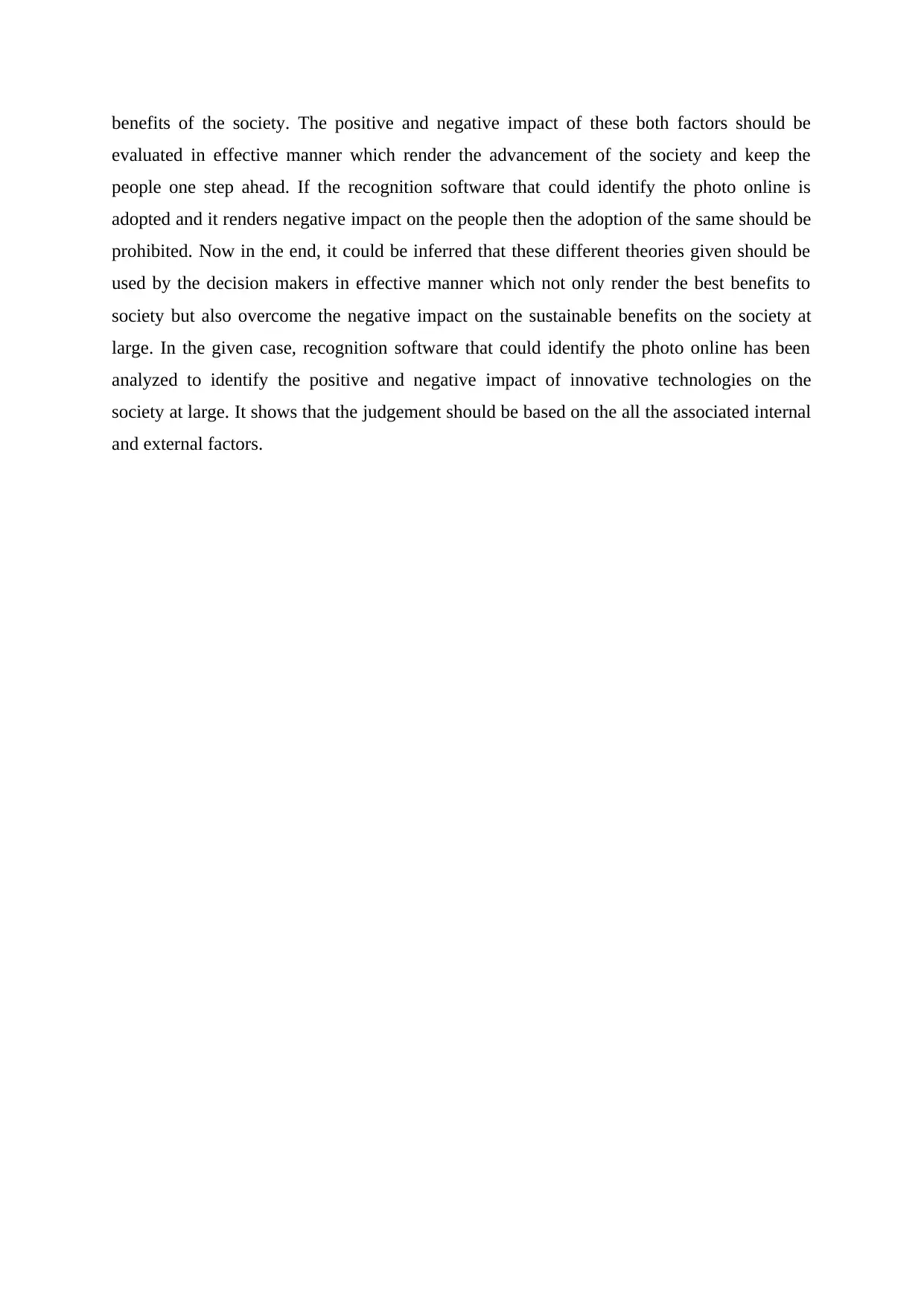
benefits of the society. The positive and negative impact of these both factors should be
evaluated in effective manner which render the advancement of the society and keep the
people one step ahead. If the recognition software that could identify the photo online is
adopted and it renders negative impact on the people then the adoption of the same should be
prohibited. Now in the end, it could be inferred that these different theories given should be
used by the decision makers in effective manner which not only render the best benefits to
society but also overcome the negative impact on the sustainable benefits on the society at
large. In the given case, recognition software that could identify the photo online has been
analyzed to identify the positive and negative impact of innovative technologies on the
society at large. It shows that the judgement should be based on the all the associated internal
and external factors.
evaluated in effective manner which render the advancement of the society and keep the
people one step ahead. If the recognition software that could identify the photo online is
adopted and it renders negative impact on the people then the adoption of the same should be
prohibited. Now in the end, it could be inferred that these different theories given should be
used by the decision makers in effective manner which not only render the best benefits to
society but also overcome the negative impact on the sustainable benefits on the society at
large. In the given case, recognition software that could identify the photo online has been
analyzed to identify the positive and negative impact of innovative technologies on the
society at large. It shows that the judgement should be based on the all the associated internal
and external factors.
Paraphrase This Document
Need a fresh take? Get an instant paraphrase of this document with our AI Paraphraser
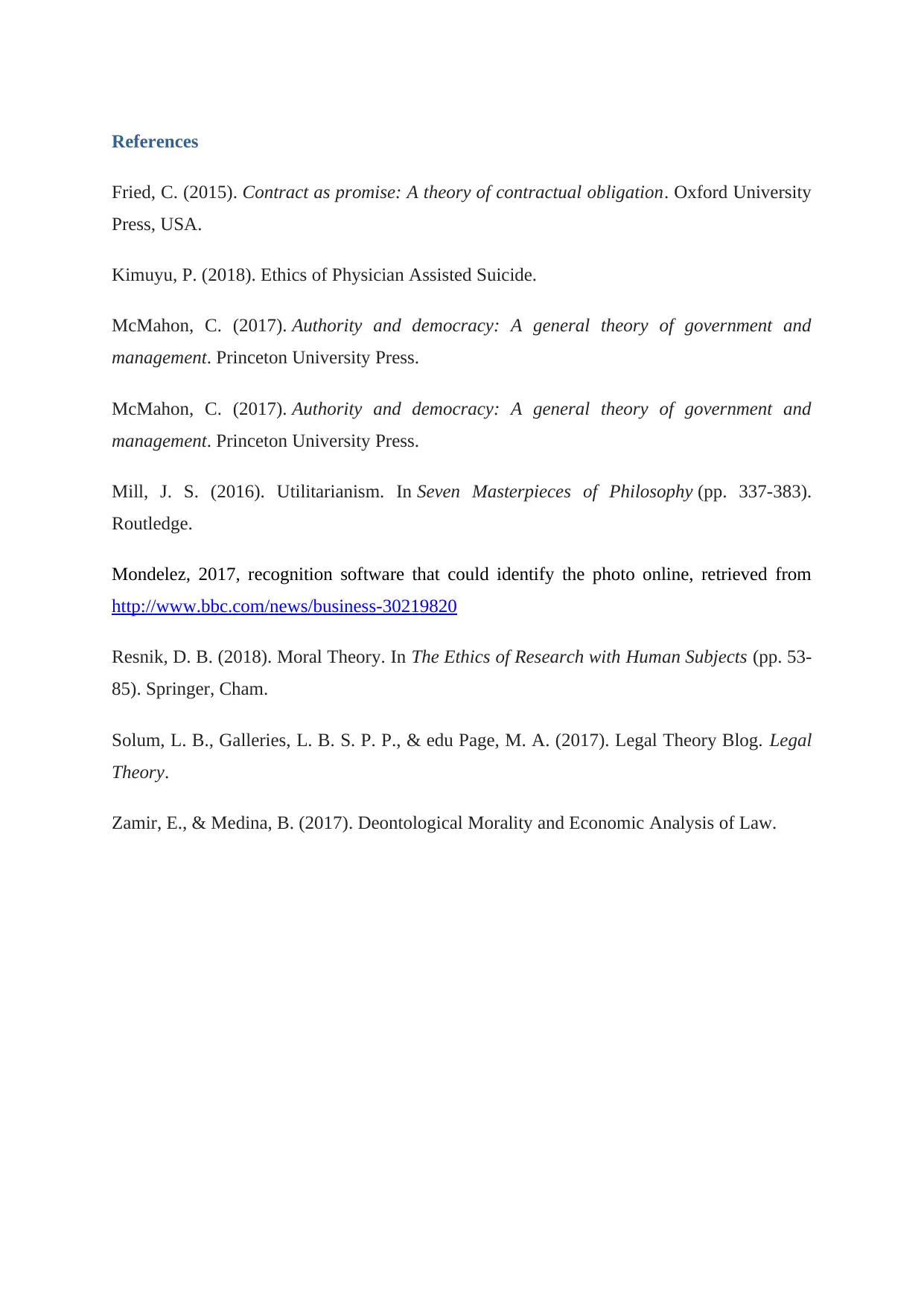
References
Fried, C. (2015). Contract as promise: A theory of contractual obligation. Oxford University
Press, USA.
Kimuyu, P. (2018). Ethics of Physician Assisted Suicide.
McMahon, C. (2017). Authority and democracy: A general theory of government and
management. Princeton University Press.
McMahon, C. (2017). Authority and democracy: A general theory of government and
management. Princeton University Press.
Mill, J. S. (2016). Utilitarianism. In Seven Masterpieces of Philosophy (pp. 337-383).
Routledge.
Mondelez, 2017, recognition software that could identify the photo online, retrieved from
http://www.bbc.com/news/business-30219820
Resnik, D. B. (2018). Moral Theory. In The Ethics of Research with Human Subjects (pp. 53-
85). Springer, Cham.
Solum, L. B., Galleries, L. B. S. P. P., & edu Page, M. A. (2017). Legal Theory Blog. Legal
Theory.
Zamir, E., & Medina, B. (2017). Deontological Morality and Economic Analysis of Law.
Fried, C. (2015). Contract as promise: A theory of contractual obligation. Oxford University
Press, USA.
Kimuyu, P. (2018). Ethics of Physician Assisted Suicide.
McMahon, C. (2017). Authority and democracy: A general theory of government and
management. Princeton University Press.
McMahon, C. (2017). Authority and democracy: A general theory of government and
management. Princeton University Press.
Mill, J. S. (2016). Utilitarianism. In Seven Masterpieces of Philosophy (pp. 337-383).
Routledge.
Mondelez, 2017, recognition software that could identify the photo online, retrieved from
http://www.bbc.com/news/business-30219820
Resnik, D. B. (2018). Moral Theory. In The Ethics of Research with Human Subjects (pp. 53-
85). Springer, Cham.
Solum, L. B., Galleries, L. B. S. P. P., & edu Page, M. A. (2017). Legal Theory Blog. Legal
Theory.
Zamir, E., & Medina, B. (2017). Deontological Morality and Economic Analysis of Law.
1 out of 8
Related Documents
Your All-in-One AI-Powered Toolkit for Academic Success.
+13062052269
info@desklib.com
Available 24*7 on WhatsApp / Email
![[object Object]](/_next/static/media/star-bottom.7253800d.svg)
Unlock your academic potential
Copyright © 2020–2026 A2Z Services. All Rights Reserved. Developed and managed by ZUCOL.





